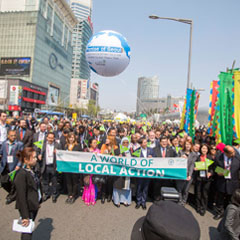This article is the part of a series of features introducing new members of the Cities Alliance.
The world’s leading network of over 1,000 cities, towns and metropolises committed to building a sustainable future.
[4 April 2016] – Recently, Cities Alliance welcomed ICLEI – Local Governments for sustainability to the partnership.
The partnership is a natural one. Cities Alliance is a diverse coalition of actors that help advance the role of cities in sustainable and equitable development. And as a global network of local and subnational governments working toward sustainable development, ICLEI is strongly committed to this goal.
ICLEI was attracted to the Cities Alliance for the opportunities to exchange information and knowledge among Cities Alliance members. It was interested working alongside other members to identify synergies in expertise and exchange knowledge that enables the network to advance sustainable urban development with a strong social dimension.
ICLEI also saw the opportunity to engage in meaningful project work through Cities Alliance, alongside other members who have complementary expertise in the thematic fields covered by the Cities Alliance Joint Work Programmes, such as Resilient Cities and Habitat III advocacy.
Integrating new dimensions into ICLEI's services
As a member of the partnership, ICLEI hopes to increase its bilateral cooperation with other Cities Alliance members and to develop joint strategies that reflect a deep and integrated understanding of sustainable urban development and its many components.
ICLEI focuses on 10 thematic agendas that build sustainable cities, towns and regions. Cities Alliance has a strong background in poverty alleviation, slum upgrades and social equity, and through its membership, ICLEI will increasingly integrate these dimensions into the services and tools it develops.
In fact, the strong social focus at Cities Alliance will soon show through in ICLEI’s Resilient Cities agenda. At the 7th Resilient Cities congress series hosted by ICLEI in Bonn, Germany this July, ICLEI will, for the first time, explore the role of informal settlements, equity and rights in working toward inclusive and resilient urban development. This conference brings together the foremost thinkers in urban sustainability, and the partnership with Cities Alliance has enabled ICLEI to more closely examine the social dimension of resilience.
25+ years of experiences with sustainable development
ICLEI is a wide-reaching global network that has focused on sustainable development throughout its 25-year history. It has a diversity of technical experts working in offices across the world as well as more than 1,000 Members that are committed to sustainability. ICLEI knows how to construct policies and processes that will transform cities and has always placed knowledge exchange at the centre of its function as a network. It will bring this knowledge and collaborative mindset to the partnership with Cities Alliance.
Furthermore, with its wide geographic spread, ICLEI can offer its knowledge of the development needs, priorities and influences in a number of regions across the world and can communicate sustainability concepts in many languages. Its diverse Membership base also enables ICLEI to understand how cities, towns and regions of varying sizes and capacities can pave a sustainable path that recognises the unique opportunities and challenges at various stages in the process.
Engaging with Cities Alliance Joint Work Programmes
ICLEI will be actively engaged in Cities Alliance Joint Work Programmes, which focus on a number of important and crosscutting issues.
The Joint Work Programme on Resilient Cities is exploring new areas for collaboration and innovation, and will add further depth to an area in which ICLEI is actively engaged. ICLEI is looking forward to a strong discussion on inclusivity at the Resilience Cities congress series this year, thanks to its partnership with Cities Alliance.
ICLEI is also excited to participate in the Cities Alliance Joint Work Programme for Habitat III as it engages in global consultation, stakeholder engagement and negotiating processes to ensure the New Urban Agenda offers a platform for comprehensive sustainable urban development.
ICLEI sees it as vital that multi-level, multi-stakeholder partnerships emerge from Habitat III, offering strong supporting mechanisms for cities to implement sustainability initiatives aligned with SDG Goal 11, the Paris Agreement and other sustainability frameworks.
ICLEI’s View: There is no alternative
One of the great strengths of the Cities Alliance partnership is the diversity of its members, each one with a different perspective. We asked ICLEI to share how it views sustainable cities: We simply can no longer think of urbanisation as occurring separately from sustainable development.
Sustainable cities are the key to our transition toward global sustainability, as they are home to a majority of the global population and emit the majority of greenhouse gas emissions. As the urban population grows, creating sustainable cities is an undeniable priority.
To become sustainable, cities must act in a holistic fashion, which means they aim to address a number of interconnected dimensions of sustainability. Our 10 urban agendas provide a structure for cities to consider the many aspects that contribute to lasting sustainability, which works towards a future that is low-carbon, resilient, ecomobile, biodiverse, resource-efficient and productive, healthy and happy, with a green economy and smart infrastructure.
It is important for cities to consider the linkages between these agendas and how progress in one area might actually yield results in another. To ensure that projects are crosscutting and holistic, we encourage cities to pursue a nexus approach that links departments and finds synergies.

Local leaders march for sustainability in Seoul, Korea in April 2015. Photo: ICLEI.
ICLEI sees Cities Alliance as a strong coalition of the willing, a group of organisations pooling their knowledge and resources to facilitate tangible advancements within and among cities.
Related Items:




